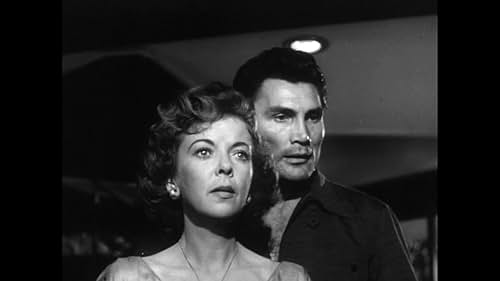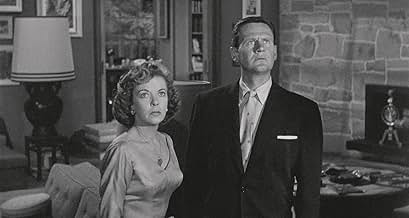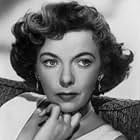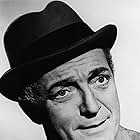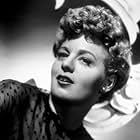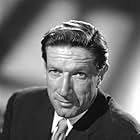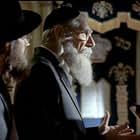IMDb RATING
6.8/10
4.5K
YOUR RATING
Hollywood actor Charles Castle is pressured by his studio boss into a criminal cover-up to protect his valuable career.Hollywood actor Charles Castle is pressured by his studio boss into a criminal cover-up to protect his valuable career.Hollywood actor Charles Castle is pressured by his studio boss into a criminal cover-up to protect his valuable career.
- Awards
- 1 win & 2 nominations
Michael Winkelman
- Billy Castle
- (as Mike Winkelman)
Shelley Winters
- Dixie Evans
- (as Miss Shelley Winters)
Richard Boone
- Narrator
- (voice)
- (uncredited)
Nick Cravat
- Nick
- (uncredited)
Robert Emhardt
- Bit Part
- (uncredited)
Michael Fox
- Prize Fight Announcer
- (uncredited)
Paula Kyle
- Party Guest
- (uncredited)
- Director
- Writers
- All cast & crew
- Production, box office & more at IMDbPro
Storyline
Did you know
- TriviaBecause of its vitriolic take on Tinseltown, this was unsurprisingly turned down by all the major studios in Hollywood. It eventually found a home at United Artists.
- GoofsThe camera and operator are visibly reflected in one scene in the living room.
- Quotes
Smiley Coy: A woman with six martinis can ruin a city.
- Crazy creditsIn the opening credits: Upholstered furniture by Martin/ Brattrud.
- ConnectionsFeatured in Les dossiers de l'écran: Les coulisses du cinéma (1970)
Featured review
"The Big Knife" caused a sensation when it came out. After all, no one in his right mind would dare to criticize the movie industry, after all, it was the studio and its ruthless executives that were exposed as the bad guys, even at the time where the old studio system was disappearing.
Clifford Odets wrote the original play, which under Robert Aldrich direction doesn't translate to the screen because it feels claustrophobic in many aspects. The movie treatment was by James Poe, did not make the material come alive because of the theatricality of the source.
Charles Castle, an actor working in Hollywood, is about to commit himself to a renewal of his contract to a major studio. That means another seven years of his life working in whatever pictures the higher ups have in store for him. It couldn't come at a worse time; his wife, Marion, who evidently hasn't a good relation with Charles, is fed up with the idea of staying in Bel Air. Marion pleads with him to give up the movie business so they could have a normal life bringing up their young son.
Castle has had his share of adventures in Hollywood, something that Marion is aware of. In addition to that, he has a dark secret, something that involved a terrible accident for which his publicist has taken the blame and has even serve time in jail. A couple of women are also in the picture, threatening Charles' marriage.
To make matters worse, Charles is visited by the head of the studio, Stanley Hoff, who has brought his assistant, the oily Smiley Coy, to help him convince Castle to sign the contract. Charles Castle is finally defeated at the game as Stanley plays his cards right since he has the upper hand. The result is a bitter loss for the actor, who sees no way out of the situation at hand.
Jack Palance, who, up to this film, had only minor parts, rose to the challenge of playing Charles Castle, who in a way, he had the background, having been a boxer, to play. His work, although a bit unsure, was a revelation to the movie going public at the time. Ida Lupino, an excellent actress, is probably the best thing in the picture. Rod Steiger shows up as the studio head Stanley Hoff, a man that knows well his opponent's weaknesses and uses all in his power to get his way. Wendell Corey, in a small part, also does good work. Jean Hagen and Shelley Winters also contribute to the film.
Ernest Lazlo's cinematography works well, as does the musical score by Frank DeVol. Robert Aldrich, a man with a lot of experience in the business, was a natural choice to undertake the direction of this picture. His only problem was a basic one, how to open the play to cinematic terms.
Clifford Odets wrote the original play, which under Robert Aldrich direction doesn't translate to the screen because it feels claustrophobic in many aspects. The movie treatment was by James Poe, did not make the material come alive because of the theatricality of the source.
Charles Castle, an actor working in Hollywood, is about to commit himself to a renewal of his contract to a major studio. That means another seven years of his life working in whatever pictures the higher ups have in store for him. It couldn't come at a worse time; his wife, Marion, who evidently hasn't a good relation with Charles, is fed up with the idea of staying in Bel Air. Marion pleads with him to give up the movie business so they could have a normal life bringing up their young son.
Castle has had his share of adventures in Hollywood, something that Marion is aware of. In addition to that, he has a dark secret, something that involved a terrible accident for which his publicist has taken the blame and has even serve time in jail. A couple of women are also in the picture, threatening Charles' marriage.
To make matters worse, Charles is visited by the head of the studio, Stanley Hoff, who has brought his assistant, the oily Smiley Coy, to help him convince Castle to sign the contract. Charles Castle is finally defeated at the game as Stanley plays his cards right since he has the upper hand. The result is a bitter loss for the actor, who sees no way out of the situation at hand.
Jack Palance, who, up to this film, had only minor parts, rose to the challenge of playing Charles Castle, who in a way, he had the background, having been a boxer, to play. His work, although a bit unsure, was a revelation to the movie going public at the time. Ida Lupino, an excellent actress, is probably the best thing in the picture. Rod Steiger shows up as the studio head Stanley Hoff, a man that knows well his opponent's weaknesses and uses all in his power to get his way. Wendell Corey, in a small part, also does good work. Jean Hagen and Shelley Winters also contribute to the film.
Ernest Lazlo's cinematography works well, as does the musical score by Frank DeVol. Robert Aldrich, a man with a lot of experience in the business, was a natural choice to undertake the direction of this picture. His only problem was a basic one, how to open the play to cinematic terms.
- How long is The Big Knife?Powered by Alexa
Details
Box office
- Budget
- $423,000 (estimated)
- Runtime1 hour 51 minutes
- Color
- Aspect ratio
- 1.85 : 1
Contribute to this page
Suggest an edit or add missing content


